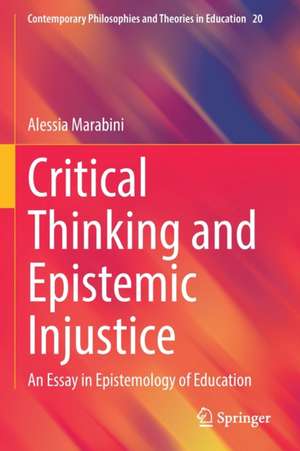Critical Thinking and Epistemic Injustice: An Essay in Epistemology of Education: Contemporary Philosophies and Theories in Education, cartea 20
Autor Alessia Marabinien Limba Engleză Paperback – 24 mar 2023
The book is an enhanced, English version of the Italian monograph Epistemologia dell’Educazione: Pensiero Critico, Etica ed Epistemic Injustice.
| Toate formatele și edițiile | Preț | Express |
|---|---|---|
| Paperback (1) | 631.29 lei 17-23 zile | +54.95 lei 6-10 zile |
| Springer International Publishing – 24 mar 2023 | 631.29 lei 17-23 zile | +54.95 lei 6-10 zile |
| Hardback (1) | 730.47 lei 6-8 săpt. | |
| Springer International Publishing – 23 mar 2022 | 730.47 lei 6-8 săpt. |
Din seria Contemporary Philosophies and Theories in Education
- 15%
 Preț: 638.11 lei
Preț: 638.11 lei -
 Preț: 385.25 lei
Preț: 385.25 lei -
 Preț: 481.05 lei
Preț: 481.05 lei - 15%
 Preț: 523.54 lei
Preț: 523.54 lei -
 Preț: 380.84 lei
Preț: 380.84 lei - 18%
 Preț: 880.25 lei
Preț: 880.25 lei - 15%
 Preț: 637.28 lei
Preț: 637.28 lei - 15%
 Preț: 640.55 lei
Preț: 640.55 lei - 15%
 Preț: 635.47 lei
Preț: 635.47 lei - 18%
 Preț: 721.63 lei
Preț: 721.63 lei - 18%
 Preț: 885.95 lei
Preț: 885.95 lei - 18%
 Preț: 775.30 lei
Preț: 775.30 lei - 15%
 Preț: 633.68 lei
Preț: 633.68 lei - 15%
 Preț: 634.68 lei
Preț: 634.68 lei - 15%
 Preț: 635.96 lei
Preț: 635.96 lei - 18%
 Preț: 730.65 lei
Preț: 730.65 lei -
 Preț: 392.97 lei
Preț: 392.97 lei -
 Preț: 393.52 lei
Preț: 393.52 lei - 15%
 Preț: 645.28 lei
Preț: 645.28 lei
Preț: 631.29 lei
Preț vechi: 830.64 lei
-24% Nou
Puncte Express: 947
Preț estimativ în valută:
120.80€ • 131.63$ • 101.79£
120.80€ • 131.63$ • 101.79£
Carte disponibilă
Livrare economică 29 martie-04 aprilie
Livrare express 18-22 martie pentru 64.94 lei
Preluare comenzi: 021 569.72.76
Specificații
ISBN-13: 9783030957162
ISBN-10: 3030957160
Pagini: 225
Ilustrații: XIX, 225 p. 1 illus.
Dimensiuni: 155 x 235 mm
Greutate: 0.38 kg
Ediția:1st ed. 2022
Editura: Springer International Publishing
Colecția Springer
Seria Contemporary Philosophies and Theories in Education
Locul publicării:Cham, Switzerland
ISBN-10: 3030957160
Pagini: 225
Ilustrații: XIX, 225 p. 1 illus.
Dimensiuni: 155 x 235 mm
Greutate: 0.38 kg
Ediția:1st ed. 2022
Editura: Springer International Publishing
Colecția Springer
Seria Contemporary Philosophies and Theories in Education
Locul publicării:Cham, Switzerland
Cuprins
Chapter 1. Introduction.- Chapter 2. Reasoning.- Chapter 3. Ethics, education, and reasoning.- Chapter 4. Critical Thinking and Epistemic Value.- Chapter 5. Critique of Critical Thinking: Bildung and the Value of Critical Thinking.- Chapter 6. Critical Thinking and Education Injustice.- Chapter 7. Conclusions. Education injustice and critical thinking between Bildung, cultural heritage and recognition.
Notă biografică
Alessia Marabini is a high school professor in Italy and a member of Centre for Knowledge and Society (CEKAS) at the University of Aberdeen. She graduated with a BA (Laurea) in Philosophy of Language and a PhD in Mind, Language and Logic at the University of Bologna. Her areas of research are epistemology and philosophy of education. In epistemology of education, she has contributed to the debate with articles published in the Journal of Philosophy of Education. She has also given talks at the Universities of Seattle, Chicago, Calgary, Oxford, MGU Moscow, Venezia, APA in Boston and UCL Institute of Education. She has published various monographs, in Italian including La Concezione Epistemica dell’Analiticità: un Dibattito in Corso (The Conception of Epistemic Analyticity: An Ongoing Debate) 2013 (Aracne: Rome), and Epistemologia dell’Educazione: Pensiero Critico, Etica ed Epistemic Injustice(Epistemology of Education: Critical Thinking, Ethics and Epistemic Injustice) 2020 (Aracne: Rome).
Textul de pe ultima copertă
This book argues that the mainstream view and practice of critical thinking in education mirrors a reductive and reified conception of competences that ultimately leads to forms of epistemic injustice in assessment. It defends an alternative view of critical thinking as a competence that is normative in nature rather than reified and reductive. This book contends that critical thinking competence should be at the heart of learning how to learn, but that much depends on how we understand critical thinking. It defends an alternative view of critical thinking as a competence that is normative in nature rather than reified and reductive. The book draws from a conception of human reasoning and rationality that focuses on belief revision and is interwoven with a Bildung approach to teaching and learning: it emphasises the relevance of knowledge and experience in making inferences.
The book is an enhanced, English version of the Italian monograph Epistemologia dell’Educazione: Pensiero Critico, Etica ed Epistemic Injustice.
Caracteristici
Casts new light on Critical Thinking in Education Gives an original contribution to the wider debate on Epistemic Injustice Contrasts Competence Based Education in relation to a Bildung approach
